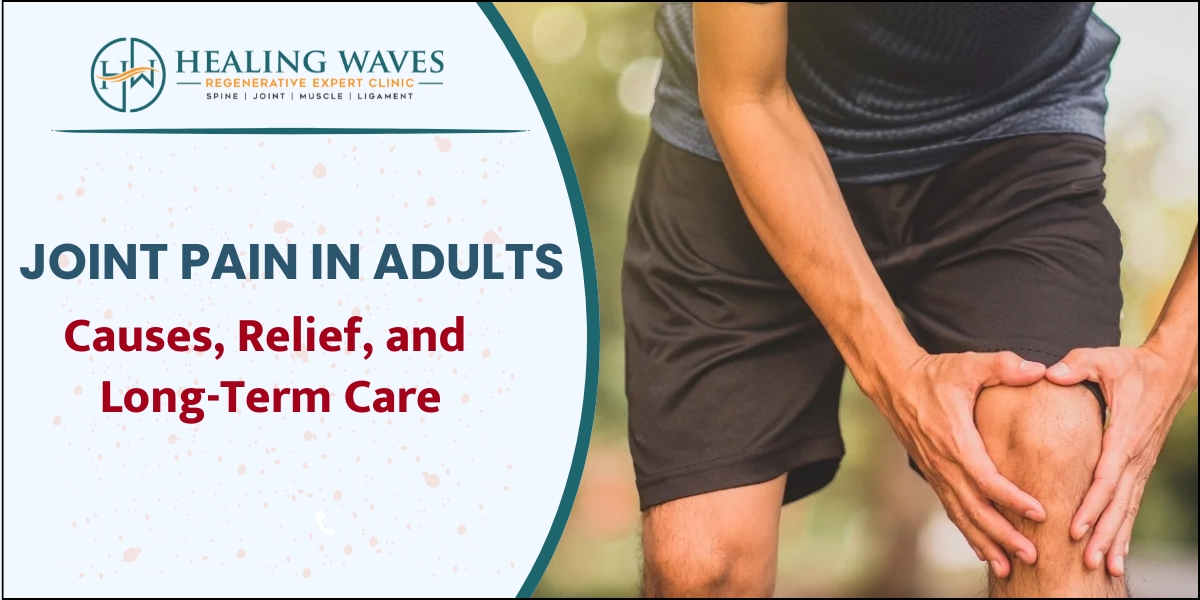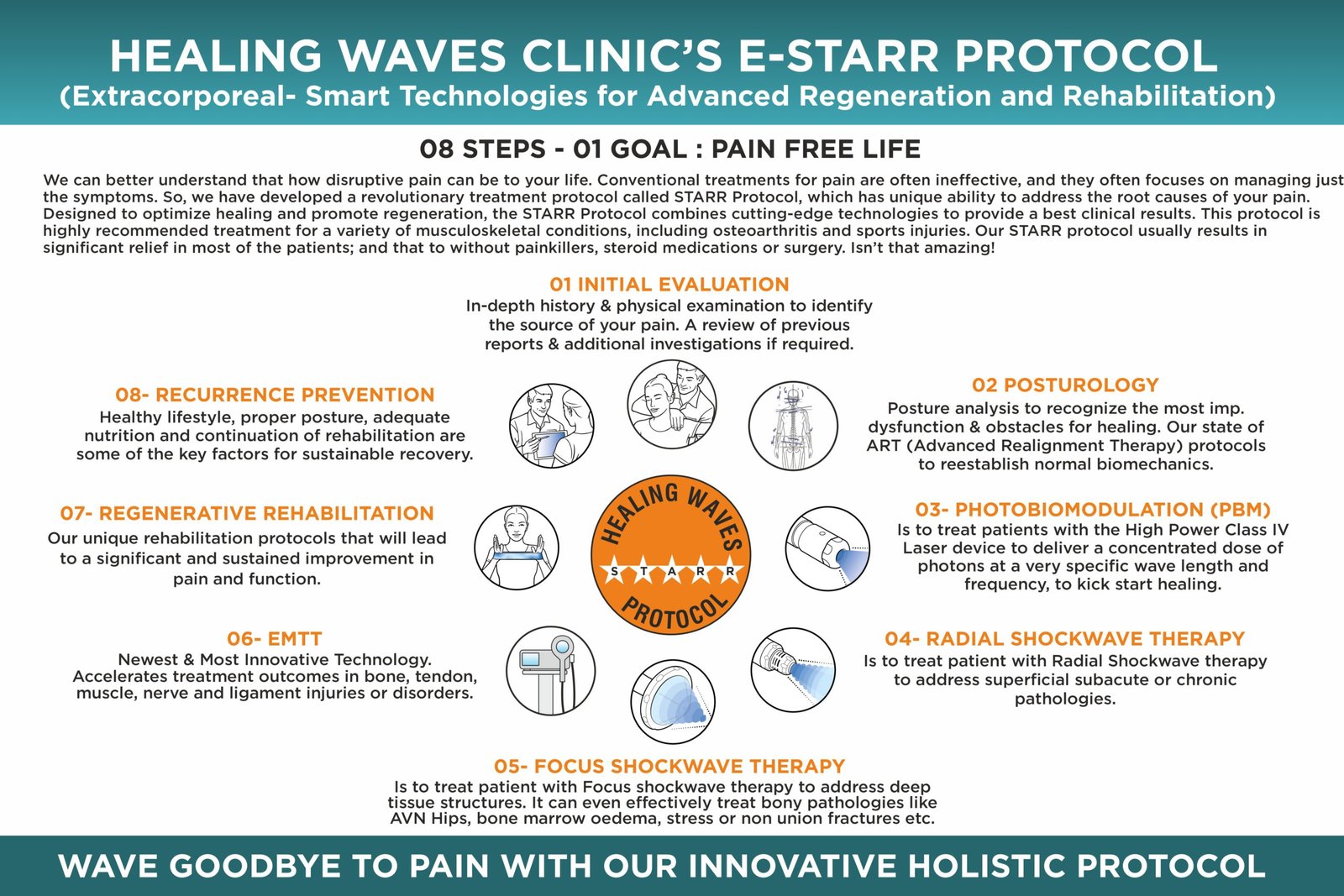- healingwavesclinic@gmail.com

Joint pain is a common complaint that can range from a minor nuisance to a debilitating condition. It can impact your daily life, making simple tasks like climbing stairs or opening a jar a challenge. At Healing Waves Clinic, a leading centre for Joint Pain Treatment in Kharadi, we believe that understanding your pain is the first step toward effective management.
This guide will walk you through the common causes, immediate relief options, and essential long-term care strategies to help you live a more comfortable, active life.
Joint pain isn’t a single disease; it’s a symptom with numerous potential causes. For adults, the most frequent culprits include:
Osteoarthritis (OA): The most common form of arthritis, often referred to as “wear-and-tear” arthritis. It occurs when the protective cartilage that cushions the ends of your bones wears down over time.
Rheumatoid Arthritis (RA): An autoimmune disorder where your immune system mistakenly attacks the joints, causing inflammation, pain, and potential joint deformity.
Injuries: Sprains, strains, and fractures can damage the structures within and around the joint, leading to acute or chronic pain.
Bursitis: Inflammation of the bursae, the small, fluid-filled sacs that cushion bones, tendons, and muscles near your joints.
Gout: A form of arthritis characterized by sudden, severe attacks of pain, redness, and tenderness in joints, often the big toe, caused by a buildup of uric acid crystals.
While the underlying cause must be diagnosed by a professional, several methods can provide immediate relief:
The R.I.C.E. Method: For acute pain or injuries, Rest, Ice, Compression, and Elevation can reduce swelling and numb the pain.
Heat Therapy: A warm bath or heating pad can soothe stiff joints and relax surrounding muscles.
Over-the-Counter Medications: Nonsteroidal anti-inflammatory drugs (NSAIDs) like ibuprofen can help reduce both pain and inflammation.
Gentle Movement: Contrary to instinct, complete rest can sometimes worsen stiffness. Gentle stretching and low-impact exercises like swimming or cycling can maintain mobility.
Managing joint pain is often a marathon, not a sprint. Long-term care focuses on preserving joint function and improving your quality of life.
Maintain a Healthy Weight: Every extra kilogram puts additional stress on weight-bearing joints like your hips and knees. Weight management is one of the most powerful tools for joint health.
Stay Active with Low-Impact Exercise: Regular exercise strengthens the muscles around the joints, providing better support. Focus on activities like walking, yoga, or water aerobics.
Adopt an Anti-Inflammatory Diet: Incorporate foods rich in omega-3 fatty acids (like salmon), antioxidants (berries, leafy greens), and spices like turmeric to help combat inflammation.
Listen to Your Body: Learn to balance activity with rest. Push through pain is not advisable and can cause further damage.
If your joint pain is severe, persistent, or accompanied by swelling, redness, or warmth around the joint, it’s time to consult a specialist. At Healing Waves Clinic, our experts provide comprehensive diagnoses and create personalized treatment plans. We combine advanced physiotherapy, lifestyle counselling, and non-invasive therapies to address the root cause of your pain and guide you toward lasting relief.
Don’t let joint pain dictate your life. Take the first step towards a pain-free future.
1. What is the most common cause of joint pain?
The most common cause of joint pain in adults is osteoarthritis, the wear-and-tear of joint cartilage over time.
2. When should I be worried about joint pain?
You should consult a doctor if the pain is severe, lasts for more than a few days, is accompanied by swelling, redness, or fever, or prevents you from using the joint normally.
3. What are the 5 worst foods for joint pain?
Common inflammatory foods include processed sugars, refined carbohydrates, red meat, fried foods, and excessive alcohol.
4. What vitamin helps with joint pain?
Vitamin D is crucial for bone health and immune function, and its deficiency has been linked to increased pain sensitivity. Omega-3 supplements can also help reduce inflammation.
5. Can joint pain be cured?
While some conditions like osteoarthritis have no cure, the symptoms can be effectively managed through a combination of treatments, lifestyle changes, and proper medical care, allowing you to lead an active life.
Regenerative Expert Clinic, we specialize in holistic approach, which focuses on helping your body heal and regenerate naturally with innovative powerful technologies.

© 2024 Healing Waves Clinic. All Rights Reserved.